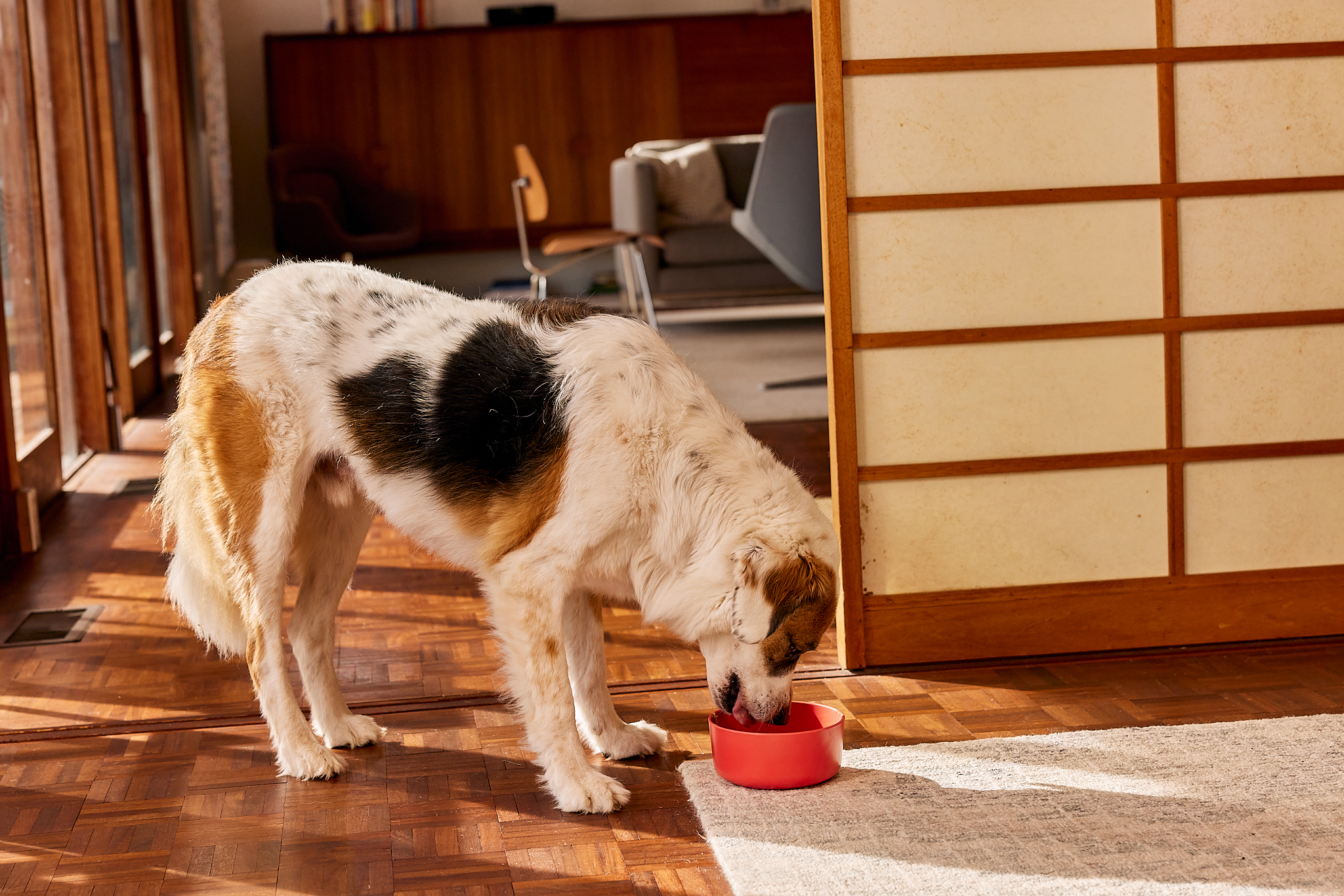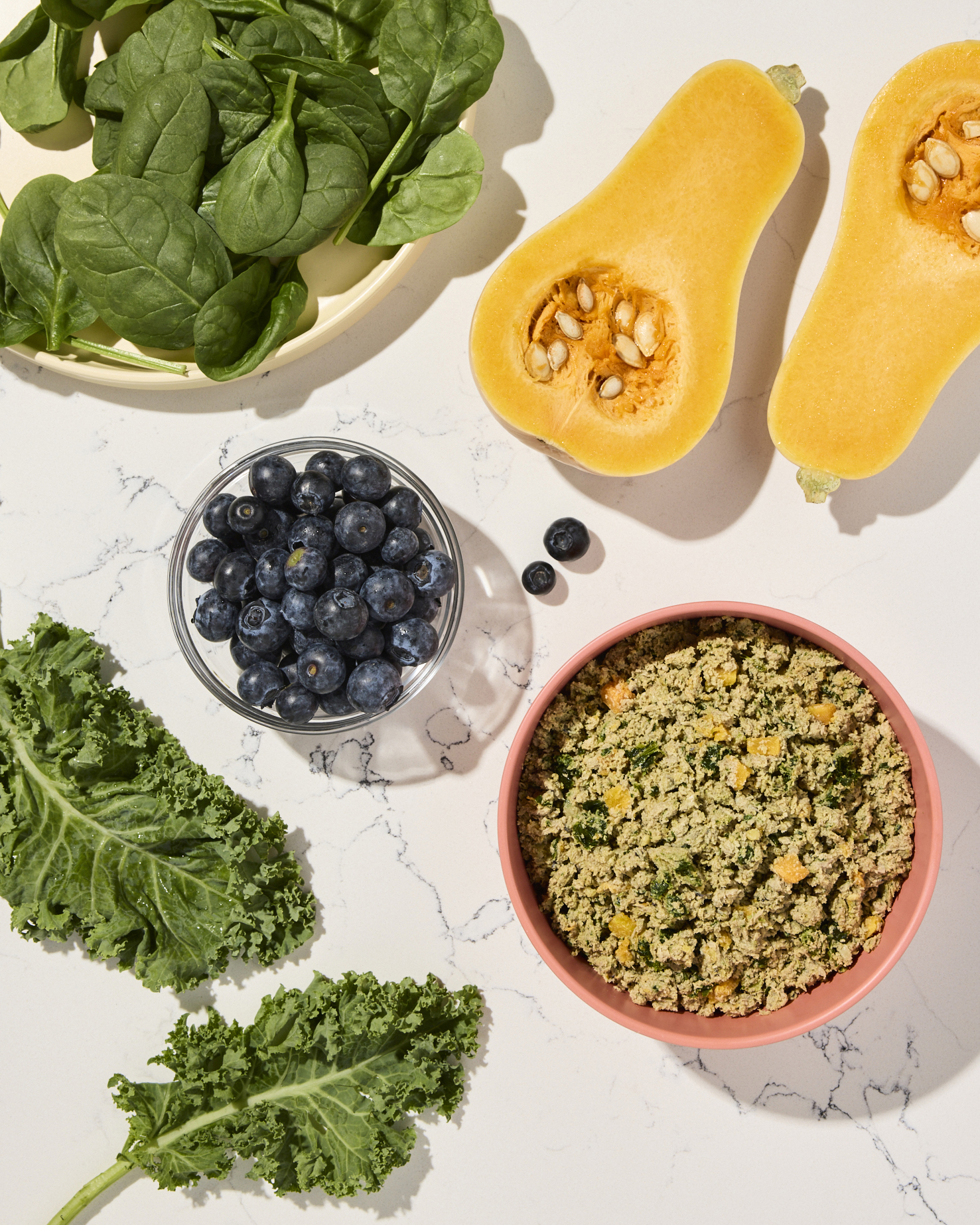Hey Ollie blog readers! We’re offering you an exclusive 60% OFF your starter box! Try now!
You pop a multivitamin every morning—so should your pup be doing the same? It might seem logical, since dogs benefit from eating a diet that’s similar to humans’ in quality of ingredients. “Many of the vitamins important to our bodies play the same roles in metabolism and structural functioning in our pets,” says Korinn Saker, DVM, Ph.D., an associate professor of clinical nutrition at North Carolina State University. But while they need certain vitamins, they don’t necessarily need to take one. Find out which are most crucial for your canine and ensure he’s always getting the right amount of all of them.
Which vitamins are essential for pups
There are two main classes of vitamins—water-soluble (like B and C) and fat soluble (A, D, E, and K)—and just like you, your dog benefits from both. “Water-soluble vitamins are associated with metabolism and making sure dogs can use nutrients for energy, while fat-soluble vitamins are for structural and functional things, like bone formation, cell membrane functioning, vision,” says Dr. Saker.
Water-soluble B vitamins (including biotin and folic acid) help with energy production and intermediary metabolism. Unlike humans, dogs don’t really need vitamin C; a pathway in their bodies produces it for them. Vitamin A helps maintain your dog’s vision; beta carotene is important for supporting the GI tract. Vitamin D helps a dog’s body regulate calcium, build strong bones, and maintain a healthy immune system; and Vitamin E serves as an antioxidant, while K supports blood-clotting proteins.

Where pups get the vitamins they need
If your dog is healthy and you’re giving him a diet of commercial food that’s labeled “Complete and Balanced,” he’s likely fine without any extra vitamins by way of supplements. Whipping up meals for your pup at home? It’s harder than you might think. Pay attention to fruits and veggies that are good sources of the vitamins he needs—like sweet potatoes for vitamin A and beets for folate. That being said, even if your at-home recipes are packed with fresh produce, they likely don’t have the concentrated doses of vitamins that your dog needs, says Dr. Saker. In those instances, a vitamin supplement is necessary and you should consult your vet for the appropriate dosage based on the rest of your dog’s diet.
Why supplements are smart for some dogs
While you shouldn’t give your dog a vitamin or nutritional supplement just because, there are some cases where your dog might benefit.Your pup may have an underlying health condition or one that develops as he gets older. In this case, you might want to ask about supplements that can support your pup’s heath or control symptoms. Dogs with dermatosis can benefit from extra zinc, for instance, and those with hip dysplasia might need a supplement formulated for joint support.
Dogs that are super-active—ones that go on long runs, pull a sled, or run around on hunting trips, for example—can also benefit from additional antioxidants, says Dr. Saker. She advises that owners who have dogs that fall into this category look into a vitamin E supplement to support their pup’s physiological structure and active performance.
Why don’t dogs need Vitamin C?
Vitamin C for dogs sounds good in theory, but do they really need this supplement?
The short answer is that the majority of dogs don’t need to take vitamin C, and in fact, too much vitamin C can be dangerous for our pups. That’s because dogs actually produce vitamin C in their bodies through the metabolism of glucose and therefore don’t need it from an outside source the way we humans do. In fact, humans are the rare animal that doesn’t produce Vitamin C. A dog with normal energy levels (not exhibiting lethargy) that is being fed a properly balanced diet will produce sufficient vitamin C internally.

Dangers of Vitamin C For Dogs
Because dogs don’t need to ingest vitamin C, giving your pup this supplement can actually have adverse effects. If dogs have an excess of vitamin C that their bodies can’t use, it turns into a metabolic waste called calcium oxalate. This increases a dog’s risk of calcium oxalate stones forming in the bladder or the kidney. Dogs with bladder or kidney stones often suffer from difficulty urinating, blood in the urine (similar to a UTI), and swelling in the bladder.
Calcium oxalate bladder stones must be treated with a catheter to flush the bladder which we assume is about as pleasant for your dog as that sounds. If the flush doesn’t work, your pup may need surgery to remove the stones.
Benefits of Vitamin C for Dogs
On the other hand, there is some evidence that dogs with compromised immune systems, those recovering from illness, birth, or a surgical procedure, might benefit from a boost of vitamin C, but this should be done with the help of your vet.
If you think your dog might benefit from some vitamin C, it’s critical to discuss this with a professional first. And before you reach for the pill bottle, there are lots of canine-friendly superfoods, naturally rich in vitamin C, that you can feed your dog without hesitation, specifically blueberries, kale, and pumpkin. These foods pose no risk to your dog when they are enjoyed as part of a healthy, well-balanced meals, like the ones from Ollie!
When there’s too much of a good thing
Of course, just because vitamins are generally beneficial for your dog’s overall well-being doesn’t mean you can’t go overboard. Not all dogs need a supplement, and adding one to your dog’s diet with no basis might do more harm than good, says Dr. Saker. “An example would be a dog that is given vitamin D supplementation just because the owner wanted, which could lead to vitamin D toxicity, hyper-calcemia, or anorexia,” she explains. Likewise, too much vitamin A can cause joint pain. Bottom line: Your vet knows what’s best when it comes for vitamins for your pup, so talk to them before adding any supplements to the menu.
The Ollie blog is devoted to helping pet parents lead healthier lives with their pups. If you want to learn more about our fresh, human-grade food, check out MyOllie.com.
Tagged As:

The nutrition your dog needs,
the food they want.

Enjoying our articles? Subscribe our Newsletters and get new articles directly to your inbox
You might also like
3 July 2025
5 MINS READ
How Fresh Food Can Help Your Dog Have Perfect Poops
As a pup parent, you’re likely very familiar with your dog’s bathroom habits. While it may not be the most glamorous part of taking care of your pup, a dog’s stool can be one of the most dir…
by Ollie Pets
4 June 2025
5 MINS READ
How Can Fresh Dog Food Help with Weight Management?
Maintaining a healthy weight is one of the most important aspects of your dog’s overall health and longevity. Being overweight or underweight can result in health complications and conditions that…
23 May 2025
5 MINS READ
Why Fresh Dog Food Makes Happier, Healthier Dogs That Live Longer
Every pup parent wants their dog to live a long, happy life, and the path to a healthier, happier dog starts with what’s in their bowl. Recent research and expert insights reveal that fresh dog …
by Ollie Pets







